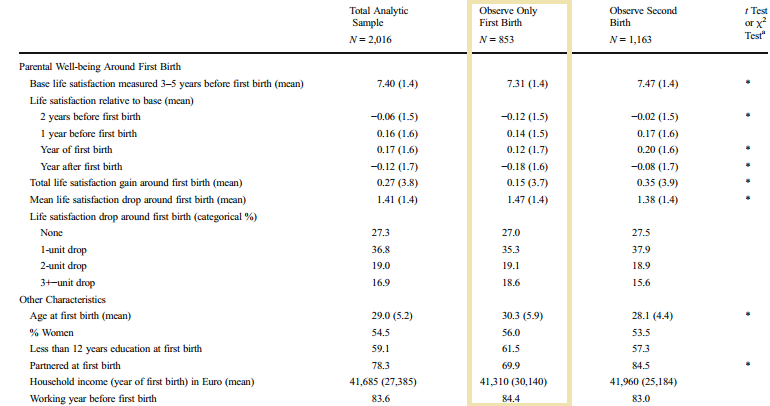The article directly links the papers abstract which in turn links the full paper. Both of which are always really nice.
What population does it apply to?
Subjective well-being levels over the period of having a first child. We measure
levels of subjective well-being over the transition to parenthood, measured from
two years before a child is born until the year after a first birth.
...
We use data from the German Socio-Economic Panel Study (SOEP), a nationally
representative longitudinal study of private households run by the German Institute
for Economic Research (DIW Berlin). Every year, nearly 11,000 households and more
than 20,000 persons are interviewed. The data provide information on all household
members, consisting of Germans living in the old (West) and new (East) German states,
foreigners, and recent immigrants to Germany.
Are new parents generally unhappy?
Life satisfaction three to five years before a first birth is high, at an average of 7.4 on a scale of 0–10. Life satisfaction increases in the
year prior to and in the year of a first birth, and then decreases from the baseline level.
...

How is this measured?
Our key independent variable is parents’ subjective well-being, measured annually
over the course of the transition to parenthood. Respondents were asked annually,
“How satisfied are you with your life, all things considered?” Responses range from 0
(completely dissatisfied) to 10 (completely satisfied). This is a distal measure of overall
positive well-being. Although this measure does not capture respondents’ overall
experience of having a child, it is preferable to direct questions about childbearing
because it is considered taboo for new parents to say negative things about a
new child
I would expect there to be several factors including the state of the parents, such as health of child and income....
. Those who have a more difficult transition to parenthood are more likely
to be women, have lower levels of household income, are less educated, and are
less likely to be working.
Here's another news article about the study that's a bit more informative. Note though I'm not sure where they got the info on the comparison to other major life events. It's not in that study.

